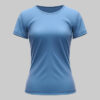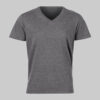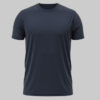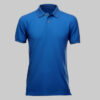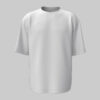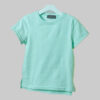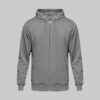Choosing the Right Fabric for T-Shirt Making: A Guide

A Guide T-shirts are perhaps the most ubiquitous item of clothing worldwide, loved for their comfort, versatility, and style. But have you ever wondered what goes into choosing the fabric for these beloved garments? From cotton to blends and beyond, the fabric used in t-shirt making plays a crucial role in determining its quality, comfort, and durability. Let’s delve into the world of t-shirt fabrics to understand what makes each type unique and how to make an informed choice when shopping for your next favourite tee.Totbox can provide all these varieties of fabrics which are
Cotton:
The Classic Choice Cotton remains the king of t-shirt fabrics for several compelling reasons. Known for its softness, breathability, and natural comfort, cotton t-shirts are ideal for everyday wear, casual outings, and even as sleepwear. The absorbent nature of cotton makes it comfortable in warm weather by allowing airflow, which helps to keep you cool.

Polyester
The Performance Enhancer Polyester t-shirts are favoured for their durability and moisture-wicking properties. Unlike cotton, polyester doesn’t absorb moisture but rather wicks it away from the skin, making it a popular choice for athletic wear and outdoor activities. Polyester blends, such as cotton-polyester mixes, combine the comfort of cotton with the strength and quick-drying properties of polyester, offering a balance of performance and comfort.

Blends
Combining the Best of Both Worlds Cotton-polyester blends are widely used in t-shirt production due to their ability to merge the benefits of both fabrics. Blends can offer enhanced durability, reduced shrinkage, and sometimes a softer feel compared to 100% polyester. They also tend to be more wrinkle-resistant and easier to care for than pure cotton shirts.

Modal and Bamboo
Sustainable Alternatives Modal and bamboo are newer entries into the t-shirt fabric market, known for their softness and sustainable credentials. Modal, made from beech tree pulp, is prized for its silky texture and resistance to shrinking and fading. Bamboo fabric, derived from bamboo grass, is exceptionally soft, hypoallergenic, and has natural antibacterial properties.

T-Shirt Blends Fabrics and Blend Ratios
Although poly-blend originally referred to combining two or even three different fabrics of polyester materials, today, it’s commonly used to describe the creation of semi-synthetic fibers.
Through blending, the textile industry can produce fabrics that exhibit properties unachievable with either fibre alone. If you want your t-shirts to be durable, poly-blend is the way to go.
T-shirt blends are made to complement each other. Here are the most common:
- Cotton / Spandex Blend. More elastic and wrinkle-resistant than cotton alone.
- Rayon / Polyester Blend. Rayon wood pulp makes it much more comfortable.
- Cotton / Polyester or Spandex Blend. Stretchy, comfortable, and won’t wrinkle easily.
- Polyester / Viscose Blend. Strong and resistant to shrinking. Viscose adds softness.
Most Common Blend Ratios
Blend ratios vary among producers. Let’s take a look at some of the most common:
- 80% Polyester / 20% Cotton Blend. One of the best fabrics for athletic wear – soft, versatile, and easy to care for in long-term use and multiple wash cycles.
- 52% Cotton / 48% Polyester Blend. Good for casual wear – comfortable, durable, lightweight, dries quickly, and is less likely to shrink than pure cotton.
- 90% Cotton / 10% Polyester Blend. Commonly used for t-shirts – soft, comfortable, and breathable but can be prone to shrinkage.
Other common blends include 75% polyester / 25% cotton, 65% polyester / 35% cotton, 65% cotton / 35% polyester, 50% / 50%, and so on.
When it comes to tri-blend fabric, manufacturers combine polyester, cotton, and rayon. The final result is one of the softest t-shirt material options available – adding a light and silky drape.
If you want your designs to stand out, tri-blend is one of the best shirt materials. Here are some of our customizable items from tri-blend fabric:
Choosing the Right Fabric for Your Needs
When selecting a t-shirt based on fabric, consider the following factors:
- Comfort: How does the fabric feel against your skin? Cotton and modal are known for their softness, while polyester and blends offer durability and moisture-wicking properties.
- Climate: Consider where you’ll be wearing the t-shirt. Cotton is great for warm weather due to its breathability, while polyester blends are better suited for athletic activities or cooler temperatures.
- Durability: Polyester and blends tend to be more durable and resistant to shrinking compared to pure cotton shirts.
- Style: Different fabrics drape differently, affecting the overall look of the t-shirt. Modal and tri-blend fabrics often have a more refined and drapey appearance, while cotton and cotton blends offer a classic casual look.




